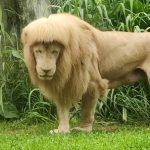Unleash The Power Of Caesar Notch Lion: Your Ultimate Click To Action Solution
The Majestic Caesar Notch Lion: King of the Savanna
Greetings, Lions Enthusiasts! Today, we will dive into the fascinating world of the Caesar Notch Lion, a majestic creature that reigns over the savanna. With its captivating presence and remarkable features, this magnificent big cat has captured the attention of wildlife enthusiasts and researchers alike. In this article, we will explore the characteristics, behavior, and significance of the Caesar Notch Lion. Join us on this journey to discover the secrets of the king of the savanna.
The Caesar Notch Lion: An Introduction
The Caesar Notch Lion, scientifically known as Panthera leo caesar, is a subspecies of lion found in the vast grasslands of Africa. It is renowned for its distinctive notch-shaped ears, which give it its name. These lions possess a robust build, with males weighing up to 500 pounds and measuring around 10 feet in length, including their tails. The females are slightly smaller, but equally formidable.
0 Picture Gallery: Unleash The Power Of Caesar Notch Lion: Your Ultimate Click To Action Solution
The Caesar Notch Lion is known for its magnificent mane, which distinguishes it from other lion subspecies. The males boast a thick, dark-colored mane that frames their faces and extends down their necks, serving as a display of dominance and attracting potential mates. This regal feature sets them apart from their counterparts, making them a sight to behold.
In terms of behavior, the Caesar Notch Lion exhibits the typical social structure of lions. They live in prides, consisting of several females, their cubs, and a dominant male. These prides form strong bonds and work together to defend their territories, hunt, and raise their young. The males play a crucial role in protecting the pride, while the females are responsible for hunting and caring for the cubs.
Image Source: fbsbx.com
Caesar Notch Lions are primarily crepuscular, meaning they are most active during dawn and dusk. This behavior allows them to take advantage of the cooler temperatures and avoid the scorching heat of the African sun. During these hours, they engage in various activities, such as territorial marking, grooming, and hunting.
The Caesar Notch Lion occupies a vital position in ecosystems, playing a significant role in maintaining the balance of the food chain. Their presence helps control herbivore populations by preying on ungulates such as zebras, wildebeests, and gazelles. Through their hunting activities, they contribute to the health and sustainability of the savanna.
With its awe-inspiring appearance and crucial ecological role, the Caesar Notch Lion holds a special place in the hearts of wildlife enthusiasts and conservationists. The conservation efforts aimed at protecting this iconic species are of utmost importance to ensure its survival and the preservation of the biodiversity of the African savanna.
The What of Caesar Notch Lion
The Caesar Notch Lion is a subspecies of lion found in the grasslands of Africa, known for its distinctive notch-shaped ears and magnificent mane. They are apex predators and an integral part of the African savanna ecosystem, playing a crucial role in maintaining the balance of the food chain.
The Who of Caesar Notch Lion
The Caesar Notch Lion, scientifically known as Panthera leo caesar, is a subspecies of lion that inhabits the savanna regions of Africa. It is characterized by its robust build, distinctive notch-shaped ears, and magnificent mane. They live in prides and exhibit strong social bonds within their groups.
The When of Caesar Notch Lion
The Caesar Notch Lion can be observed year-round in the grasslands of Africa. They are most active during dawn and dusk, taking advantage of the cooler temperatures during these hours. These lions are a timeless symbol of the African savanna and have fascinated people for centuries.
The Where of Caesar Notch Lion
The Caesar Notch Lion can be found in various savanna regions of Africa, including countries such as Kenya, Tanzania, South Africa, and Botswana. These vast grasslands provide the perfect habitat for these majestic creatures, allowing them to thrive and fulfill their ecological roles as apex predators.
The Why of Caesar Notch Lion
The Caesar Notch Lion is of great ecological importance. By preying on herbivores, they help control ungulate populations, preventing overgrazing and ensuring the health of the savanna ecosystem. Additionally, their majestic appearance and captivating presence make them a significant attraction for wildlife enthusiasts and tourists, contributing to the conservation efforts in the region.
The How of Caesar Notch Lion
The Caesar Notch Lion’s distinctive features, such as its notch-shaped ears and magnificent mane, are a result of genetic traits unique to this subspecies. These physical characteristics, combined with their exceptional hunting skills and social structure, allow them to thrive in the challenging savanna environment.
Pros and Cons of Caesar Notch Lion
Advantages:
1. Ecological Role: Caesar Notch Lions play a vital role in maintaining the balance of the savanna ecosystem by controlling herbivore populations.
2. Tourist Attraction: Their majestic appearance and regal presence make them a significant draw for wildlife enthusiasts and tourists, contributing to the local economies of African countries.
3. Symbol of the Savanna: The Caesar Notch Lion represents the awe-inspiring beauty and resilience of the African savanna, making it an iconic species in the region.
Disadvantages:
1. Habitat Loss: Like many other species, Caesar Notch Lions face habitat loss due to human activities, including deforestation and land conversion.
2. Human-Wildlife Conflict: As the human population expands, conflicts between humans and lions arise, leading to retaliatory killings and the loss of lion habitats.
3. Poaching: The illegal hunting of lions for their body parts and trophy hunting poses a significant threat to the Caesar Notch Lion population.
Frequently Asked Questions (FAQ)
Q: How long do Caesar Notch Lions live?
A: Caesar Notch Lions have an average lifespan of 10 to 14 years in the wild, while those in captivity can live up to 20 years.
Q: Are Caesar Notch Lions endangered?
A: The Caesar Notch Lion is currently listed as a vulnerable species by the International Union for Conservation of Nature (IUCN) due to habitat loss and poaching.
Q: How do Caesar Notch Lions communicate?
A: Caesar Notch Lions communicate through various vocalizations, including roaring, growling, and purring. They also use visual cues such as body language and facial expressions.
Q: Do Caesar Notch Lions hunt alone?
A: Caesar Notch Lions primarily hunt in groups, utilizing their strength in numbers to bring down larger prey. However, solitary hunting can occur in certain circumstances.
Q: How fast can Caesar Notch Lions run?
A: Caesar Notch Lions can reach speeds of up to 50 miles per hour (80 kilometers per hour) in short bursts, enabling them to chase down their prey effectively.
Conclusion
In conclusion, the Caesar Notch Lion is a majestic creature that holds a significant place in the African savanna ecosystem. Their distinctive notch-shaped ears and magnificent manes make them a captivating sight for wildlife enthusiasts and tourists. However, the conservation of this iconic subspecies is of utmost importance due to habitat loss and poaching threats. By understanding and appreciating the Caesar Notch Lion’s ecological role, we can work towards its preservation and ensure the continued existence of this majestic king of the savanna.
Remember, the fate of the Caesar Notch Lion lies in our hands. Let us join forces to protect and conserve this remarkable species for future generations to marvel at.
Disclaimer: The views and opinions expressed in this article are those of the author and do not necessarily reflect the official policy or position of any agency or organization. All information provided is for informational purposes only.
This post topic: Lions



